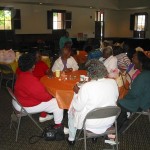Over the past year since the publication of my book 30 Lessons for Living: Tried and True Advice from the Wisest Americans, I have been gratified and touched by how much interest there is in harnessing the power of elder wisdom to improve our daily lives. People have asked for more details about the book and where the idea came from.
have been gratified and touched by how much interest there is in harnessing the power of elder wisdom to improve our daily lives. People have asked for more details about the book and where the idea came from.
So I’m pleased to share an interview I conducted with the terrific ideas blog Farnam Street. It was a great opportunity to share some of the thinking that went behind the book, as well as my favorite lessons for living from the 1200 elders.
* * *
INTERVIEWER
Can you tell me about yourself? This was a fascinating project, how did this project come about?
PILLEMER
As a gerontologist – someone who studies older people – I realized that I had focused much of my research over the past 25 years on problems of aging: nursing homes, Alzheimer’s disease, elder abuse. And that’s how our society also often looks at old people: as frail, needy, and about to bust our federal budget. But in my work, I kept meeting older people – many of whom had lost loved ones, been through tremendous difficulties, and had serious health problems – but who nevertheless were happy, fulfilled, and deeply enjoying life. I found myself asking: “What’s that all about?”
And I started seeing some fascinating research in the field of positive psychology. Study after study has shown that older people – in their 70s, 80s, and beyond – are actually happier than younger people.
One day it hit me: Maybe older people know things that younger people don’t about living a happy, healthy, fulfilling life. To my surprise I found that no one had actually done a study to answer the question: What practical advice do older people have for the younger generation? That set me off on a quest for knowledge – for the practical wisdom of older people – that lasted seven years.
So two of the main reasons for doing the project are these:
First, the fundamental hypothesis of this project and the book is that older people are the most credible experts we have on how to live happy and fulfilled lives during hard times. They have experienced extraordinarily historical events that tested their limits – and they have learned how to cope with them, to survive and to thrive. They have also been through the kinds of personal challenges and tragedies that younger people lie awake at night worrying about: loss of parents and spouses, even children; the ups and downs of marriage, child-rearing problems, bad jobs and unemployment. And they have come through them, and often are happier than younger people, as research shows us. What better source of advice for living for the rest of us?
Second, it was absolutely urgent to do a project like this now. Because this precious resource – the wisdom for living from this greatest generation – is about to disappear. In 10 years, most of this extraordinary generation – who lived through poverty in the Depression, who fought or held families together in WW II – will almost all be gone. And their advice for living would be lost forever.
That’s what I was able to capture in the Legacy Project: Not clichés or platitudes – like you see in some self-help books – but real, practical advice and tips for living better, on things like how to find a mate and stay happily married, how to raise kids, how to find a great job and succeed at it, how to avoid regrets, and how to age successfully. I wanted to take it and make it easy and fun to read for younger people – and older as well.
INTERVIEWER
You interviewed a diverse group of over 1,000 seniors. A group you call “the experts” because they’ve done something we haven’t, that is, they’ve lived a long life. What is the most important lesson they want to pass along to the young?
PILLEMER
At the core of their lessons for younger people is one major insight. And this lesson is a key to understanding their other lessons. It’s a beautiful example, because it shows something older people uniquely know – because of where they stand on life’s road – but that younger people can benefit from.
This lesson is one that almost everyone expressed. And they did it vehemently. It is kind of like one of those nightmares where you are yelling and no one can hear you. What they want younger people to know is this: life is short. The older the respondent, the more likely to say that life passes by in what seems like an instant.
They say this not to depress younger people, but to get them to be more aware and selective about how they use their time. Older people practice what psychologists call ‘socioemotional selectivity” – because their time is limited, they make careful decisions about how to use their time. The discovery of the Legacy Project is that younger people can learn from this and practice it earlier in life. As one man told me: “I wish I’d learned this in my 30s instead of in my 60s; I would have had so much more time to enjoy life.”
So they tell young people to stop wasting time and instead to use it more carefully. Some implications of this insight are to say things now to people you care about, whether it is expressing gratitude, asking forgiveness, or getting information; spending the maximum amount of time with children; and savoring daily pleasures instead of waiting for “big-ticket items” to make you happy.
Another piece of advice comes from this idea that life is much shorter than you realize: Take a chance. People in their 70s, 80s, 90s and beyond endorse taking risks when you’re young, contrary to a stereotype that elders are conservative. Their message to young people starting out is “Go for it!” They say that you are much more likely to regret what you didn’t do than what you did. As one 80-year old, successful entrepreneur told me: ‘Unless you have a compelling reason to say no, always say yes to opportunities.”
INTERVIEWER
One of the things I took away from the book is that a lot of the people you interviewed believed that happiness is a choice, that we can just choose to be happy. Some people are skeptical of the claim happiness is a choice. Can you elaborate on that?
PILLEMER
One of my first interviewees made me aware of this core piece of elder wisdom. I asked her to help me to understand the sources of her happiness. She thought for a moment and then offered the explanation that could serve as a motto for the elders: “In my 89 years, I’ve learned that happiness is a choice – not a condition.”
Most of the elders said that taking charge of one’s own happiness simply must happen at some point if one is going to live a fulfilling life, and especially in old age. Not trying to assume control over everything that happens to us – they laughed at that idea – but over our own conscious attitude toward happiness.
Another elder told me: “My single best piece of advice is to take responsibility for your own happiness throughout your life.”
The elders make the key distinction between events that happen to us on the one hand, and our internal attitude toward happiness on the other. Happy in spite of. Happiness is not a passive condition dependent on external events, nor is it the result of our personalities – just being born a happy person. Instead, happiness requires a conscious shift in outlook, in which one chooses – daily – optimism over pessimism, hope over despair.
Another of the elders described this idea as a revelation to her: “The biggest light bulb over my head came to me when I saw I could move away from painful situations by using my choices. I didn’t have to stay and take the pain. I could initiate change. This was a turning point in my life.”
You can choose to be happy, the Experts tell us, in spite of financial hardship, illness and loss. And it’s not an empty cliché, because so many are doing it right now.
INTERVIEWER
What do the experts say is most important for a long and happy marriage?
PILLEMER
Their number one lesson is: Choose your mate carefully! The key is not to rush the decision, taking all the time needed to get to know the prospective partner and to determine your compatibility with them. Said one respondent: “Don’t rush in without knowing each other deeply. That’s very dangerous, but people do it all the time.” Also make sure you like his or her family.
INTERVIEWER
One of the tips was to work in a job you love. They were essentially saying life is short, choose a job for intrinsic not monetary rewards. Can you expand on that and maybe touch on any tips they had on making the best of a bad job?
PILLEMER
The elders are unanimous on that one point: Choose a career for its intrinsic value rather than how much money you will make. Our elders are keenly aware of how short life is, and they think it’s a mistake to waste precious lifetime in work you don’t like. They tell you to avoid statements like: ‘I’d really love to do ___, but I think I can make more money doing ___.’ According to our elders, you need to be able to get up on the morning excited about work, so choose your career with that in mind.
And it’s true that the older generation has this advice for work: Make the most of a bad job. Remember that many of these folks who grew up in the Great Depression had bad jobs early on – in fact, their bad jobs make our bad jobs look like good jobs! They found, however, that they learned invaluable lessons from these less-than-ideal work situations. You can learn how the industry works, about communicating with other employees, about customer service. As one man told me: ‘You can even learn from a bad boss – how not to be a bad boss!’ All this is useful in your future career.
I would add that when asked about what makes a job truly rewarding, the oldest Americans stress autonomy. They suggest that you look for a job that offers you as much self-direction as possible – and that taking a lower salary for a job that offers you greater freedom is worth it. An 82-year old successful entrepreneur told me: “The autonomy – most people never understand that. They’re slaves to somebody. The feeling that when you have this freedom –– there’s no money that can pay for it. You can’t buy it. You have to earn it, you have to feel it, and you know something? It doesn’t get better!’”
INTERVIEWER
What were their biggest regrets?
PILLEMER
When asked what they regret in life, many of the oldest Americans said: ‘I wish I’d traveled more.’ They recommend that people embrace travel, and especially when they are young. So if young people right now are wondering what to do with those graduation gifts, elder wisdom says to look into some travel (and low budget is fine) before you begin that first job.
Another of their biggest regrets made a real impression on me. I need to admit that I’m a world-class worrier. So for me a particularly striking lesson for avoiding regret – and a nearly unanimous one – was this: Stop worrying. The elders deeply regret time wasted worrying about things that never happened. So looking back from the end of life, they take a radical view of worry. As one elder told me: “Worry wastes your life.” In the book, I give readers specific tips offered by the elders for breaking the worry habit – and they work!
INTERVIEWER
What’s changed in your life — what do you do differently now — after writing this book?
PILLEMER
I can genuinely say that the six years I spent talking to older people all over the country about their lessons for living changed my own life. I have tried to put into practice what they told me as much as I can. One thing just about every elder advises is this: “Live like your life is short.” That’s one thing they know from the vantage point at the end of the life course. They say this not to depress us, but to help us make better decisions, to savor daily life, and to say things to people that need to be said (while they are still around). I have developed more of a “carpe diem” mentality since doing this project, and I think people who read the book will too.
Probably the most extraordinary thing I learned was this: Old age is much better than we think it will be. For a lot of people who read the book, I think they will wind up being a lot less fearful about the last third of life, and much more optimistic. As one person told me: “My advice about growing old? I’d tell them to find the magic.” Despite their problems, most of the people I interviewed feel that they are happier in some ways, freer, clearer in their priorities than they were when they were younger.
If anything comes out of this book, I hope it’s this: Making people aware of the source of wisdom that’s right in front of them: America’s elders. We’re going through economic upheavals and families are struggling: Who better to ask than people who survived the Great Depression? Families are struggling with our military involvements: Why not ask people who supported families through World War II? Struggling in your marriage? Why not ask people who have been happily married for 50 or 60 years? I’d love to see these kinds of conversations going on in every family – how about starting with family holidays like Thanksgiving?









